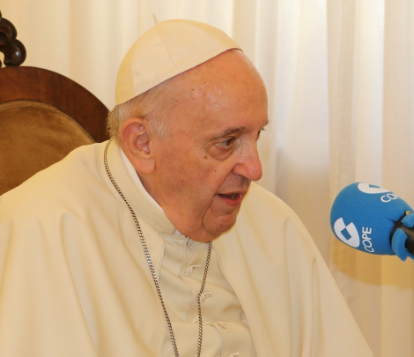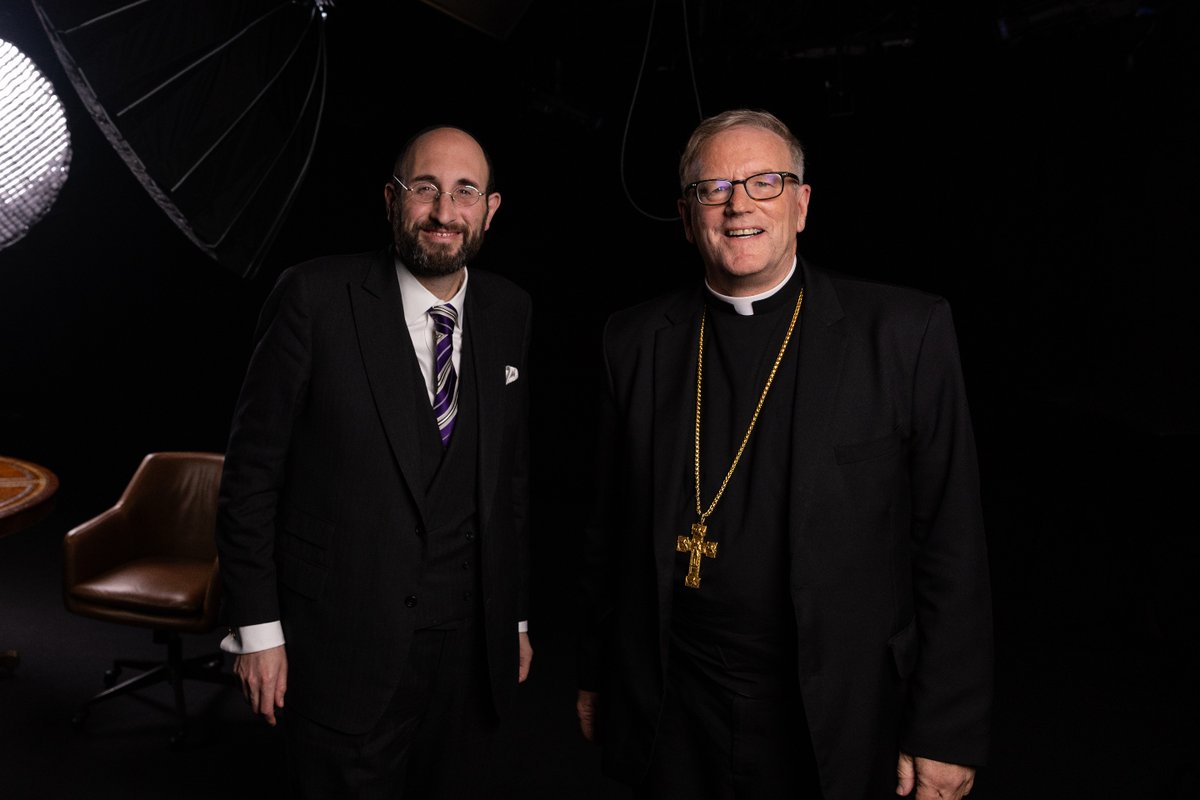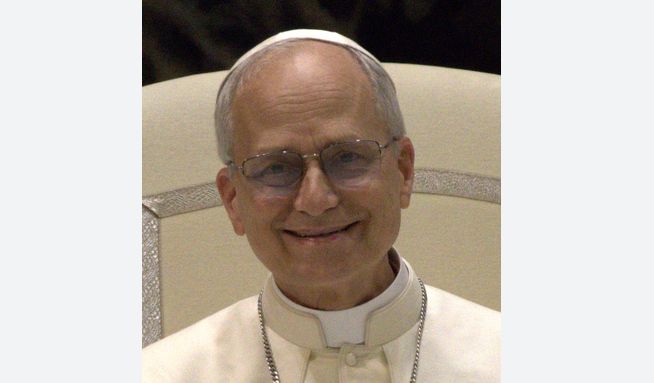CAUTION! Francis speaks!
Francis in new Interview: “I’m Rather Shy”, Mass Readings in Latin “Like Laughing at the Word of God” — and more!

Dangerous combination: Jorge Bergoglio and an open microphone
It should be a pretty safe bet to say that “Pope” Francis has never met a microphone he didn’t like. Just recently, he got to speak into one for roughly 75 minutes, and the result of that encounter was published today.
Spanish journalist Carlos Herrera has interviewed the Jesuit pseudo-pope Jorge Bergoglio at his residence in Vatican City for the radio station Cadena de Ondas Populares Españolas — COPE for short — which is owned by Spain’s Novus Ordo bishops. The official publication page for the interview is this one:
- “El Papa con Herrera” (COPE)
The original audio is available below, in Spanish:
The interview is Bergoglio’s first since his recent surgery, and his voice seems feeble.
A transcript of the entire conversation has been published in both Spanish and English by the Vatican:
- “El Papa tras su operación: ‘Ni se me pasó por la cabeza renunciar'” (Vatican News)
- “Pope after operation: ‘It never crossed my mind to resign'” (Vatican News)
Compared to previous interviews — and he’s given literally dozens of them since 2013, perhaps as many as 50 or 60 — this one doesn’t contain anything too outrageous. But then that’s only by comparison. When this man gets to talk freely for 75 minutes, you have what amounts to just about infallible certitude that he’s going to say something blasphemous, heretical, erroneous, outrageous, or otherwise objectionable. And indeed, the Argentinian apostate squatting in the Vatican guest house didn’t fail to deliver.
The following are what we’ve selected as the interview highlights from the lengthy English transcript provided by Vatican News.
For the sake of clarity, context, and fairness, we will first provide a headline quote (in blue and bold) and then share the journalist’s question (in bold) and the full (or substantial portion of the) answer the fake pope gave in which the headline quote appears (which will be underlined). After each entry, we’ll provide a little bit of commentary. Again, the full interview transcript can be found here.
Highlight 1: “I am obeying what was set at the time.”
In March it will be nine years since the beginning of your Pontificate, which has not been that brief pontificate of 4-5 years that Your Holiness said. Are you satisfied with the changes undertaken or is there anything pending that you would like to finish off imminently? That is to say, do you have the feeling that God has given you some extra time for something?
Obviously, the appointment took me by surprise because I came with a small suitcase. Because I had my cassock here. I had been given one as a gift when I became a cardinal and I left it at the home of some nuns so as not to have to… I belonged to five or six congregations here and so I had to travel, so I didn’t have to come with that… I came as usual. And I left the Holy Week homilies prepared there in the bishopric. That is to say, it caught me by surprise. But I didn’t invent anything; what I did from the beginning is to try to put into action what we cardinals said in the pre-conclave meetings for the next Pope: the next Pope has to do this, this, this, this. And this is what I started to do. I think there are several things still to be done, but there is nothing invented by me. I am obeying what was set at the time. Maybe some people did not realize what they were saying or thought it was not so serious, but some topics cause pain, it is true. But there is no originality of mine in the plan. And my working roadmap, Evangelii gaudium, is one thing in which I tried to summarize what we cardinals were saying at the time.
Commentary: Here Francis is making the case that his subversion of Catholic Faith and morals is really just what all the “cardinals” proposed collectively just before the 2013 conclave. In this manner, he is effectively extending the blame to many others. What he says with regard to that may very well be true, but at the end of the day, it’s his job — well, it would be if he were a true Pope — to do what is for God’s glory and for the salvation of souls, not “obey” some revolutionary program agreed upon by Modernists: “…and you have made void the commandment of God for your tradition” (Mt 15:6).
Highlight 2: “Keep it up, it’s all the same, there in hell we’re gonna reunite.”
I guess the Pope can allow himself disappointments like any Christian. As Holy Father, what has been the biggest disappointment you have had, Your Holiness?
I had several. I had several disappointments in life and that’s good because disappointments are like emergency landings. They are like emergency landings in life. And the point is to get up. There is an alpine song that says a lot to me: “In the art of climbing, what matters is not not to fall, but not to stay fallen”. And you, faced with a disappointment, have two ways: either you stay there saying that this is not going to work—as the tango [song] says: “Dale que va, que todo es igual, que allá en el horno nos vamos a encontrar” [Lyrics, in Argentine slang, of a tango song from the 1930’s: “Keep it up, it’s all the same, there in hell we’re gonna reunite”]—or I get up and bet again. And I believe that in the face of a war, in the face of a defeat, even in the face of one’s own disappointment or one’s own failure or one’s own sin, one must get up and not remain fallen.
Commentary: That figures. Francis not only knows and remembers, but actually uses in a public interview, a line from a tango song that speaks about ending up in hell. It is noteworthy that the only time Francis ever mentions hell is when he either (a) denies the dogma, (b) makes a joke about it, or (c) condemns the mafia (which makes for easy applause). Indeed he has the uncanny ability to reflect on death without ever mentioning judgment, heaven, or hell. Isn’t that interesting? And, by the way, the tango has been condemned as immoral. But then, if there is no hell…
Highlight 3: “I’m not one to bang on the table, I don’t get it. I’m rather shy.”
Highlight 4: “…the proclamation of the Word [must] be in a language that everyone understands; otherwise it would be like laughing at the Word of God.”
I don’t know if Pope Francis is a man who likes to bang his fist on the table. Would it be possible that the last blow on the table has been the pontifical document limiting the celebration of the ‘Tridentine Masses’? And I also ask you to explain to my audience what the ‘Tridentine Mass’ is, what is it about the Tridentine Mass that is not mandatory.
I’m not one to bang on the table, I don’t get it. I’m rather shy. The history of Traditionis custodes is long. When first St. John Paul II—and later Benedict, more clearly with Summorum Pontificum—, gave this possibility of celebrating with the Missal of John XXIII (prior to that of Paul VI, which is post-conciliar) for those who did not feel good with the current liturgy, who had a certain nostalgia… it seemed to me one of the most beautiful and human pastoral things of Benedict XVI, who is a man of exquisite humanity. And so it began. That was the reason. After three years he said that an evaluation had to be made. An evaluation was made, and it seemed that everything was going well. And it was fine. Ten years passed from that evaluation to the present (that is, thirteen years since the promulgation [of Summorum Pontificum]) and last year we saw with those responsible for Worship and for the Doctrine of the Faith that it was appropriate to make another evaluation of all the bishops of the world. And it was done. It lasted the whole year. Then the subject was studied and based on that, the concern that appeared the most was that something that was done to help pastorally those who have lived a previous experience was being transformed into ideology. That is, from a pastoral thing to ideology. So, we had to react with clear norms. Clear norms that put a limit to those who had not lived that experience. Because it seemed to be fashionable in some places that young priests would say, “Oh, no, I want…” and maybe they don’t know Latin, they don’t know what it means. And on the other hand, to support and consolidate Summorum Pontificum. I did more or less the outline, I had it studied and I worked, and I worked a lot, with traditionalist people of good sense. And the result was that pastoral care that must be taken, with some good limits. For example, that the proclamation of the Word be in a language that everyone understands; otherwise it would be like laughing at the Word of God. Little things. But yes, the limit is very clear. After this motu proprio, a priest who wants to celebrate that is not in the same condition as before—that it was for nostalgia, for desire, &c.— and so he has to ask permission from Rome. A kind of permission for bi-ritualism, which is given only by Rome. [Like] a priest who celebrates in the Eastern Rite and the Latin Rite, he is bi-ritual but with the permission of Rome. That is to say, until today, the previous ones continue but a little bit organized. Moreover, asking that there be a priest who is in charge not only of the liturgy but also of the spiritual life of that community. If you read the letter well and read the Decree well, you will see that it is simply a constructive reordering, with pastoral care and avoiding an excess by those who are not…
Commentary: No doubt, Francis is the reserved and quiet type. We know all about that from The Dictator Pope and many other stories. Don’t believe your lying eyes! Now, clearly, Bergoglio isn’t the sharpest knife in the drawer, but surely he isn’t that much of a doofus that he wouldn’t know that the readings (epistle and Gospel) of the Traditional Latin Mass are printed in the vernacular missal virtually everyone in attendance uses. Besides, on Sundays the sacred texts are always read aloud in the vernacular by the priest from the pulpit just before he gives the sermon. Of course Francis knows that — born in 1936, he grew up with this practice! Even if, for some reason, this should not have been done in Argentina, he would know from his advisors that that is the practice today for all those people he is now “limiting” with Traditionis Custodes. Either way, his objection is a silly and despicable straw man.
Highlight 5: “…I hope that soon there will be [other Vatican dicasteries] headed by a layman or a laywoman.”
On the first visit to the Vatican’s communications department, the Holy Father expressed his concern that the message was not reaching where it should. Audience numbers were poor. Was that a serious reprimand?
I was amused by the reaction. I said two things. First, a question: how many people read L’Osservatore Romano? I did not say whether many or few read it. It was a question. I think it is licit to ask, don’t you? And the second question, which was more of a theme, [I asked] when after having seen all the new work of union, the new organization chart, the functionalization, I spoke of the sickness of the organization charts, which gives a reality [that has] a more functional rather than a real value. And I said: with all this functionality, which is necessary for it to work well, we must not fall into functionalism. Functionalism is the cult of organization charts without taking reality into account. It seems that someone did not understand these two things I said, or maybe someone did not like it, or I don’t know what, and interpreted it as a criticism. But it was just a question and a warning. Yes… Maybe someone felt offside. I think the dicastery has a lot of promise, it is the dicastery with the largest budget in the Curia at the moment, headed by a layman—I hope that soon there will be others headed by a layman or a laywoman—and that it is taking off with new reforms. L’Osservatore Romano, which I call “the newspaper of the Party,” has made great progress and it is marvelous how it is making the cultural efforts it is making.
Commentary: Laity in charge of Vatican dicasteries? Sure, why not. Considering that almost all their clergy are invalidly ordained and therefore in reality laymen anyway, they might as well make it official.
Highlight 6: “And with regard to the case of abortion, I do not like to enter into discussions on whether it is possible [permissible] up to here, or whether it is not possible up to there…”
Your Holiness, in Spain, euthanasia has been legalized, on the basis of what they call the “right to a dignified death.” But that is a fallacious syllogism, because the Church does not defend incarnate suffering, but dignity to the end. How far does man have real power over his life? What does the Pope believe?
…
And with regard to the case of abortion, I do not like to enter into discussions on whether it is possible up to here, or whether it is not possible up to there, but I say this: any embryology manual given to a medical student in medical school says that by the third week of conception, sometimes before the mother realizes [that she is pregnant], all the organs in the embryo are already outlined, even the DNA. It is a life. A human life. Some say, “It’s not a person.” It is a human life! So, faced with a human life I ask myself two questions: Is it licit to eliminate a human life to solve a problem, is it fair to eliminate a human life to solve a problem? Second question: Is it fair to hire a hired killer to solve a problem? And with these two questions, what about the cases of elimination of people—on one side or the other—because they are a burden for society?
…
Commentary: These remarks by Francis are extremely important and highly concerning — so much so that we have published a separate blog post about it, which you can access here.
Highlight 7: “I don’t know where they got it from last week that I was going to resign!”
Are the days of headaches over words or attributed words that went too far and had consequences that you didn’t count on over?
The danger is always there. A word can be interpreted one way or the other, can’t it? These are things that happen. And what do I know… I don’t know where they got it from last week that I was going to resign! What word did they understand in my country? That’s where the news came from. And they say it was a commotion, when it didn’t even cross my mind. When there are interpretations that are a little distorted about some of my words, I keep quiet, because trying to clarify them is worse.
Commentary: Where did they get it? Well, the reports were that Francis himself told it to people, and of course he has publicly spoken about the possibility of resigning before. Considering what after all these years we now know about the person of Jorge Bergoglio, it is quite conceivable that he told some of his underlings that he would soon resign precisely so that the story would get out, just so he can now solemnly deny it. Yes, as his friend Omar Bello revealed, Francis loves to play both sides if he believes it to be to his advantage. Confusion and contradiction are the hallmarks of that man’s reign of (t)error.
Thus far the highlights lowlights of the most recent Francis interview.
Enough said!
Image source: cope.es (screenshot)
License: fair use





No Comments
Be the first to start a conversation